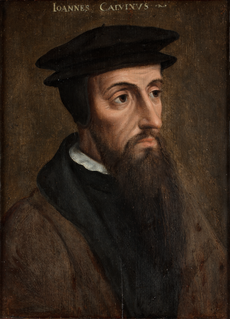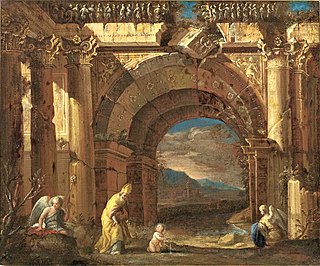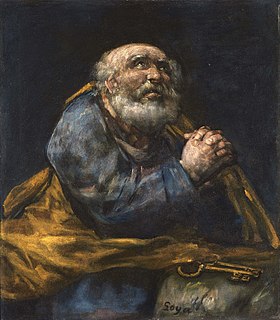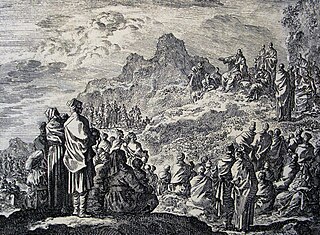
Predestination is a doctrine in Calvinism dealing with the question of the control that God exercises over the world. In the words of the Westminster Confession of Faith, God "freely and unchangeably ordained whatsoever comes to pass." The second use of the word "predestination" applies this to the salvation, and refers to the belief that God appointed the eternal destiny of some to salvation by grace, while leaving the remainder to receive eternal damnation for all their sins, even their original sin. The former is called "unconditional election", and the latter "reprobation". In Calvinism, some people are predestined and effectually called in due time to faith by God, all others are reprobated.

Anna Karenina is a novel by the Russian author Leo Tolstoy, first published in book form in 1878. Many writers consider it to be one of the greatest works of literature ever written, and Tolstoy himself called it his first true novel. It was initially released in serial installments from 1875 to 1877, all but the last part appearing in the periodical The Russian Messenger.

Penance is any act or a set of actions done out of repentance for sins committed, as well as an alternate name for the Catholic, Lutheran, Eastern Orthodox, and Oriental Orthodox sacrament of Reconciliation or Confession. It also plays a part in confession among Anglicans and Methodists, in which it is a rite, as well as among other Protestants. The word penance derives from Old French and Latin paenitentia, both of which derive from the same root meaning repentance, the desire to be forgiven. Penance and repentance, similar in their derivation and original sense, have come to symbolize conflicting views of the essence of repentance, arising from the controversy as to the respective merits of "faith" and "good works". Word derivations occur in many languages.
What is Art? is a book by Leo Tolstoy. It was completed in Russian in 1897 but first published in English due to difficulties with the Russian censors.

Purgatorio is the second part of Dante's Divine Comedy, following the Inferno and preceding the Paradiso. The poem was written in the early 14th century. It is an allegory telling of the climb of Dante up the Mount of Purgatory, guided by the Roman poet Virgil—except for the last four cantos, at which point Beatrice takes over as Dante's guide. Allegorically, Purgatorio represents the penitent Christian life. In describing the climb Dante discusses the nature of sin, examples of vice and virtue, as well as moral issues in politics and in the Church. The poem outlines a theory that all sins arise from love – either perverted love directed towards others' harm, or deficient love, or the disordered or excessive love of good things.

Repentance is one element of atoning for sin in Judaism. Judaism recognizes that everybody sins on occasion, but that people can stop or minimize those occasions in the future by repenting for past transgressions. Thus, the primary purpose of repentance in Judaism is ethical self transformation.

In Christianity, contrition or contriteness is repentance for sins one has committed. The remorseful person is said to be contrite.

In Christian hamartiology, eternal sins, unforgivable sins, unpardonable sins, or ultimate sins are sins which will not be forgiven by God. One eternal or unforgivable sin, also known as the sin unto death, is specified in several passages of the Synoptic Gospels, including Mark 3:28–29, Matthew 12:31–32, and Luke 12:10, as well as other New Testament passages including Hebrews 6:4–6, Hebrews 10:26–31, and 1 John 5:16.

"Ivan the Fool" is an 1886 short story by Leo Tolstoy, published in 1886. The name "Ivan the Fool" hints to a popular hero of Russian folklore.

An-Nur is the 24th chapter (sūrah) of the Quran with 64 verses (āyāt).
Absolution is a traditional theological term for the forgiveness imparted by ordained Christian priests and experienced by Christian penitents. It is a universal feature of the historic churches of Christendom, although the theology and the practice of absolution vary between denominations.

Resurrection, first published in 1899, was the last novel written by Leo Tolstoy. The book is the last of his major long fiction works published in his lifetime. Tolstoy intended the novel as a panoramic view of Russia at the end of the 19th century from the highest to the lowest levels of society and an exposition of the injustice of man-made laws and the hypocrisy of the institutionalized church. The novel also explores the economic philosophy of Georgism, of which Tolstoy had become a very strong advocate towards the end of his life, and explains the theory in detail. The book was one of the main reasons for his excommunication by the Holy Synod from the Russian Orthodox Church in 1901.

Matthew 3:11 is the eleventh verse of the third chapter of the Gospel of Matthew in the New Testament. The verse occurs in the section relating the preachings of John the Baptist. In this verse he predicts that he will be followed by someone much greater than himself. The main theme of this verse is that John will soon be supplanted by a much greater figure and that John's water baptism is just a preparation for the much greater baptism by fire and spirit that will occur under the second coming of the Christian messiah Jesus, an original Christian concept that, according to Jewish scholars, lacks any fundament in the Hebrew scripture.

Matthew 5:34 is the thirty-fourth verse of the fifth chapter of the Gospel of Matthew in the New Testament and is part of the Sermon on the Mount. This verse is part of either the third or fourth antithesis, the discussion of oaths.
Tawba is the Islamic concept of repenting to God due to performing any sins and misdeeds. It is a direct matter between a person and God, so there is no intercession. There is no original sin in Islam. It is the act of leaving what God has prohibited and returning to what he has commanded. The word denotes the act of being repentant for one's misdeeds, atoning for those misdeeds, and having a strong determination to forsake those misdeeds. If someone sins against another person, restitution is required.

Inferno is the first part of Italian writer Dante Alighieri's 14th-century epic poem Divine Comedy. It is followed by Purgatorio and Paradiso. The Inferno describes Dante's journey through Hell, guided by the ancient Roman poet Virgil. In the poem, Hell is depicted as nine concentric circles of torment located within the Earth; it is the "realm ... of those who have rejected spiritual values by yielding to bestial appetites or violence, or by perverting their human intellect to fraud or malice against their fellowmen".
Judaism regards the violation of any of the 613 commandments as a sin. Judaism teaches that to sin is a part of life, since there is no perfect man and everyone has an inclination to do evil "from his youth", though man is born sinless. Sin has many classifications and degrees. Some sins were punishable with death by the court, others with death by heaven, others with lashes in ancient times, and others without such punishment, but no sins committed with willful intentions go without consequence. Punishments have changed over millennia of Jewish courts, generally less severe overall. Sins committed out of lack of knowledge are not considered sins, since a sin can't be a sin if the one who did it didn't know it was wrong. Unintentional sins are considered less severe sins.
Repentance is a stage in Christian salvation where the believer turns away from sin. As a distinct stage in the ordo salutis its position is disputed, with some theological traditions arguing it occurs prior to faith and the Reformed theological tradition arguing it occurs after faith. In Catholic theology repentance is part of the larger theological concept of penance.
"The Three Hermits" is a short story by Russian author Leo Tolstoy written in 1885 and first published in 1886 in the weekly periodical Niva (нива). It appeared in the short-story collection Twenty-Three Tales which was first translated into English for an edition released by Funk & Wagnalls in 1907. The title refers to its three central characters; unnamed simple monks living on a remote island in a life of prayer and contemplation "for the salvation of their souls."
"Twenty-Three Tales" is a popular compilation of short stories by Leo Tolstoy. According to its publisher, Oxford University Press, the collection is about contemporary classes in Russia during Tolstoy's time, written in a brief, morality-tale style. It was translated to English by Louise Maude and Aylmer Maude












